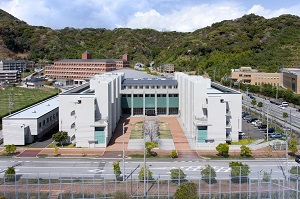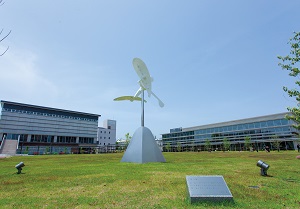本文
Graduate School of Human Life Sciences Policy
- Graduate School of Human Life Sciences Master’s Program
- Graduate School of Human Life Sciences Doctoral Program
Graduate School of Human Life Sciences
Philosophy
The Graduate School of Human Life Sciences develops high-level professionals who aim to foster the cultural development of communities and healthy, comfortable living environments, through a compound approach to teaching and researching human lifestyle, thereby taking a comprehensive perspective to resolve and adjust lifestyle issues of local communities.
Graduate School of Human Life Sciences Master’s Program
Admission Policy
The Master's Program aims to produce personnel capable of tackling lifestyle problems in communities from a comprehensive perspective based on education and research rooted in human life studies. The Master's Program, therefore, seeks individuals with the following qualities.
1. An interest in various issues related to human life and communities, and a strong sense of purpose and an exploratory mind to investigate and resolve those issues
2. Strong enthusiasm for tackling the issues actively, aspirations to learn proactively, and a strong will to accomplish these endeavors
3. Foundational knowledge and flexible thinking skills in the area of specialization
4. A humanistic mindset rich in collaboration, coordination, and rapport, to design and implement the systematization of communities in terms of nutrition, life, social welfare, and culture
Selection Policy
There are three categories for admissions to the Master's Program: “General,” “Working adults,” and “Overseas.” The basic policy of selection is as follows.
General
This category is for individuals who have graduated from a university or who are expected to graduate from a university during that academic year. Selection is conducted through the following methods.
1. Written test
This requires the applicant to write an essay on a given subject, which will be evaluated in terms of the degree to which he/she understood the question(s) presented and the appropriateness of the answer(s) to the question(s), the relevance of the answer(s) to the expertise he/she wants to develop, and the ability to compose written statements to state ideas.
2. Interview
Applicants give a presentation, which is followed by questions and answers based on the Research Plan, to examine suitability for the program and basic abilities to conduct research.
The suitability of applicants for the program is judged in accordance with the following criteria, of which at least one must apply.
- The applicant wants to contribute to solving problems in communities.
- The applicant wants to acquire a high level of professional competence.
- The applicant wants to make effective use of specialized knowledge and experience in the areas of specialization to solve the problems.
The applicant’s fundamental abilities to conduct research activities are evaluated with respect to the following.
- The applicant has a clear understanding of his/her research proposal (purpose, method, and expected results) and the notable characteristics of his/her research (novelty and originality).
- The applicant has fundamental knowledge of the specialization.
Working Adults
This category is for individuals who have graduated from a university, and have experience working at a company, a governmental agency, an educational institution, a research institution, or other types of organizations, or those who have participated in societal activities. Applicants must submit a letter of recommendation issued by another individual who knows the applicant well and has a clear understanding of the research theme. Selection is conducted through the following methods.
1. Presentation
The applicant gives a presentation. This is followed by questions and answers based on the Statement for Application to examine the reasons for his/her application, the activities he/she wants to conduct, and his/her enthusiasm and attitudes.
2. Interview
The interview involves questions and answers centered on the Research Proposal to examine what the applicant wants to learn in the program, the level of his/her professional orientation, the appropriateness of the content of his/her research proposal, his/her fundamental expertise in the area of specialization, and his/her plan for studies, etc., after enrollment. For eligibility for application to this category, the applicant must participate in one of the Graduate School Admission Briefing Sessions held several times per year and have a preliminary interview with a faculty representative after the session.
Applicants with Foreign Status
This category is for individuals who have graduated from a university, and who have neither Japanese citizenship nor permanent resident status in Japan, or those who have passed the Japanese Language Proficiency Test (N2 or 2). Selection is conducted through the following methods.
1. Presentation
The applicant gives a presentation. This is followed by questions and answers based on the Statement for Application to examine the reasons for his/her application, the activities he/she wants to conduct, and his/her enthusiasm and attitudes. The applicant’s proficiency in spoken Japanese communication is also examined.
2. Interview
The interview involves questions and answers centered on the Research Proposal to examine what the applicant wants to learn in the program, the level of his/her professional orientation, the appropriateness of the content of his/her research proposal, his/her fundamental expertise in the area of specialization, and his/her plan for studies, etc., after enrollment.
Curriculum policy
The Master's Program aims to foster students' ability as highly specialized professionals to accommodate and solve problems faced by local communities. The curriculum of the program is organized as follows.
1. Common Policy
(Structure and content)
1) The curriculum is composed of two parts: Foundational Studies and Specialized Studies. The latter part is further divided into three areas of study: Nutrition and Human Life Studies, Social Welfare Studies, and Cultural Studies. Each area of study has a Research Tutorial Seminar to foster the student's expertise, in order to form and advance his/her own research endeavors from a comprehensive perspective.
2) The area of Nutrition and Human Life Studies consists of three course sets: Food Science, Human Nutrition, and Human Life Studies.
3) The area of Social Welfare consists of four course sets: Welfare Specialty Foundation, Regional and International Welfare, Care and Elderly Welfare, and Child Family Welfare.
4) The area of Cultural Studies consists of Comprehensive Studies on Human Culture, Japanese Culture Studies, and English Language and Culture.
5) The Program for Teacher's License in School Education (Nutrition) consists of Food Science, Human Nutrition, and Nutrition and Life Studies.
6) The Program for Teacher's License in School Education (English) consists of English Language and International Cultural Studies.
(Sequence)
7) Students take Research and Ethics (required) and choose one from among the courses Research Methodology I, Ii, and Iii (elective) in the first semester of their first year to acquire fundamental research abilities.
(Implementation)
8) Advisement on coursework is provided to students to enable them to acquire the abilities stipulated in the Master’s Program Diploma Policy, according to their area of interest.
9) Balanced use of lectures, seminars, and research tutorials enables students to acquire the abilities stipulated in the Master’s Program Diploma Policy. Students learn methods of studying independently through preview assignments, review assignments, group discussions, and active learning, etc.
10) As a rule, the Program offers courses on Saturdays and Sundays in accordance with the stipulations of the Special Provision of Article 14 of the Graduate School Establishment Standards.
(Evaluation)
11) Achievement goals, criteria, and methods for lectures and seminars, aligned with the Master’s Program Diploma Policy, are made known to students. Upon completion of the curriculum, evaluation is conducted through a dissertation review and final examination.
12) Students evaluate the curriculum and the Program strives to improve it in accordance with the results.
2. Curriculum Policy by area
(1) Nutrition and Human Life Science
As a requirement for completing the program of Nutrition and Human Life studies, students must obtain a total of 30 credits or more (6 credits from Fundamental studies, 18 credits from Specialized studies, 6 credits from Research Tutorial Seminars). They also must receive necessary research guidance and pass a dissertation defense and final examination.
(Sequence)
1) Students start taking courses in the first semester of their first year, mainly from Nutrition and Human Life studies, but also from Foundational studies and Social Welfare studies in order to acquire a wide range of academic knowledge covering multiple areas.
2) Students also start taking the Research Tutorial Seminar on Nutrition and Human Life in their first year in order to identify problems and issues for exploration and acquire the ability to clarify them, and to be guided to complete their master’s theses.
(Implementation)
3) In addition to the main and secondary advisors from the field of Nutrition and Human Life studies, faculty members from the other areas participate as advisors to provide research guidance from various perspectives. The advisors also hold a joint seminar once per semester.
(2) Social Welfare
As a requirement for completing the program of Social Welfare Studies, students must obtain a total of 30 credits or more (6 credits from Fundamental studies, 18 credits from Specialized Studies, 6 credits from Research Tutorial Seminars). They also must receive necessary research guidance and pass a dissertation defense and final examination.
(Sequence)
1) Students start taking courses in the first semester of their first year, mainly from Social Welfare studies, but also from Foundational studies and Nutrition and Human Life studies in order to acquire a wide range of academic knowledge covering multiple areas.
2) Students also start taking the Research Tutorial Seminar on Social Welfare in their first year in order to identify problems and issues for exploration and acquire the ability to clarify them, and to be guided to complete their master’s theses.
(Implementation)
3) In addition to the main and secondary advisors from the field of Social Welfare studies, faculty members from the other areas participate as advisors to provide research guidance from various perspectives. The advisors also hold a joint seminar once per semester.
(3) Cultural Studies
As a requirement for completing the program of Cultural studies, students must obtain a total of 30 credits or more (6 credits from the Fundamental studies, 18 credits from the Specialized studies, 6 credits from Research Tutorial Seminars). They also must receive necessary research guidance and pass a dissertation defense and final examination.
(Sequence)
1) Students start taking courses in the first semester of their first year, mainly from Cultural Studies, but also from Foundational studies, Nutrition and Human Life studies, and Social Welfare studies in order to acquire a wide range of academic knowledge covering multiple areas.
2) Students also start taking the Research Tutorial Seminar on Cultural Studies in their first year in order to identify problems and issues for exploration and acquire the ability to clarify them, and to be guided to complete their master’s theses.
(Implementation)
3) In addition to the main and secondary advisors from the field of Cultural studies, faculty members from the other areas participate as advisors to provide research guidance from various perspectives. The advisors also hold a joint seminar once per semester.
Diploma Policy
The Master’s Program aims to foster students’ ability as highly specialized professionals who can solve and rectify the lifestyle issues of local communities.
1. Common Diploma Policy
1) The student has the academic knowledge required to conduct research in his/her field of specialization.
2) The student has a wide range of in-depth academic knowledge covering his/her area of specialization as well as in other areas.
3) The student is able to identify research questions to be pursued in light of the characteristics of local communities.
4) The student is able to conduct research that sees the community as a system.
5) The student is able to draw conclusions, grasping the set research questions from a scientific perspective.
6) The student is able to share knowledge and skills obtained through research, by means of oral presentations and/or research papers.
7) The student is able to conduct his/her research independently.
8) The student is able to focus on practical research and share the findings with communities, as well as to contribute to the systematization of the discipline.
9) The student is able to conduct academic research activities with a clear understanding of and compliance with research ethics.
2. Diploma Policy by academic disciple
(1) Nutrition and Human Life Sciences
Students who satisfy the aforementioned common completion criteria as well as the following completion criteria are awarded a Master’s degree in Human Life Science.
1. The candidate is able to utilize his/her expertise in human life and nutrition studies to focus on aspects of human lifestyles.
2. The candidate is able to identify problems related to lifestyle and nutrition in local communities from the perspective of Social Welfare Studies and to verify concrete measures for solving those problems.
(2) Social Welfare Area
Students who satisfy the aforementioned common completion criteria as well as the following completion criteria are awarded a Master’s degree in Social Welfare Studies.
1. The candidate is able to focus professional knowledge and skills in the field of social welfare on issues concerning human lifestyles.
2. In addition to comprehending welfare issues in communities from a scientific perspective, the candidate is able to verify concrete measures to solve the issues from micro, meso, and macro perspectives.
(3) Cultural Studies
Students who satisfy the aforementioned common completion criteria as well as the following completion criteria are awarded a Master’s degree in Cultural Studies.
1. The candidate is able to focus his/her specialized knowledge and skills in cultural research on human lifestyles.
2. The candidate is able to verify his/her set research questions, using methodology from the humanities and social sciences.
Graduate School of Human Life Sciences Doctoral Program
Admission Policy
The foundation of the Doctoral Program is education and research based on human life science, with the aim of fostering individuals who possess as independent researchers the ability to support knowledge-based society and the ability to take on the next generation of higher education. Accordingly, the Doctoral Program seeks individuals with the following qualities.
1. An interest in social life issues, a clear sense of purpose, a deeply inquisitive mind, and a desire to use research methods to solve problems
2. Strong enthusiasm for resolving issues and willingness to engage in academic research
3. Deep knowledge in the area of specialization, flexible thinking skills, and creativity
4. A cooperative, collaborative, and harmonious nature, rich in humanity, enabling work with people in communities from the perspectives of nutrition and human life, social welfare, and culture; the ability to plan and implement the systematization of communities; a sense of research ethics that enable contribution to the improvement of human life; and aspirations to become a researcher and professional in higher education.
Selection Policy
The examination for admission to the Doctoral Program consists of a written portion, a portion specific to the applicant’s area of specialization, an oral portion, and submittal of a research plan. These are used to make a comprehensive evaluation of the following abilities.
Written test: Evaluate the candidate’s ability to read and understand the content of text written in English and answer question(s) based on the text.
Area Specific Test:
1) Essay writing (Social Welfare Studies and Cultural Studies): Evaluate the applicant’s expertise, logical, theoretical, and analytical thinking skills, creativity, and ability to accurately comprehend and answer questions.
2) Presentation (Nutrition and Human Life Sciences): Evaluate the originality of the research that the applicant has conducted, the completeness of the presentation materials, the applicant’s attitude, the consistency of the presentation with the research plan, and answers to questions from the examiners.
Interview: Evaluate the specialization of the applicant’s intended area and his/her abilities required to conduct research, through a presentation on the research plan, as well as questions and answers.
Research plan: Evaluate the applicant’s knowledge of his/her own research topic, the significance of the research, the research objective, the research method, and descriptions, etc.
Curriculum Policy
1. Common Policy
The objective of the Doctoral Program is to foster students’ ability as advanced professionals who can independently and continuously conduct research activities, and as educational researchers to contribute to the development of higher education, on a foundation of the knowledge and skills acquired in the Master’s Program. This course is organized according to the following principles.
(Structure and contents)
1. The curriculum consists of three areas: "Common Studies,” "Specialized Studies," and "Research Tutorial Seminar"
2. The objective of these areas of Common Studies is to foster students’ abilities to approach various issues related to human lifestyles from multiple perspectives.
3. Specialized Studies consists of three areas: "Nutrition and Human Life Sciences,” "Social Welfare studies,” and "Cultural studies.”
4. The objective of Specialized Studies is to deepen the student’s understanding of trends in academic research.
5. Research Tutorials Seminars I, Ii, and Iii help students with their research explorations.
(Evaluation)
6. Achievement goals, grading criteria, and methods aligned with the Doctoral Program Diploma Policy are made known to students.
7. Final assessment is made in accordance with the items stipulated in the Diploma Policy, which define the competence students need to attain.
8. The examination of a doctoral dissertation consists of the research plan review by the main and secondary advisors, interim report meetings, review, initial dissertation review, and dissertation defense. Then, the Academic Degree Examination Committee reviews the dissertation in accordance with the Doctoral Dissertation Examination criteria.
2. Curriculum policy by area
(1) Nutrition and Human Life Sciences
(Sequence)
1. Students start taking courses in their first year, mainly from Nutrition and Human Life studies, but also from Common Studies, Social Welfare Studies, and Culture Studies, in order to acquire a wide range of academic knowledge in multiple areas of inquiry.
2. In their first year, students master analytic knowledge and skills and take the Research Tutorial Seminar in Nutrition and Human Life Studies Special Science to enable them to set research questions in line with their own independent awareness of problems, and to design a reasonable and feasible research plan.
3. Students take Research Tutorial Seminar in Nutrition and Human Life Sciences Special Study Ii in their second year to conduct research in accordance with the research plan and consider the issues with their advisors. Students also present their research findings in the interim reporting meetings.
4. Students take Research Tutorial Seminar in Nutrition and Human Life Sciences Special Study Iii in their third year to enable them to proceed to work on their dissertations while analyzing and probing the data they have collected. The preliminary examination for submitting a dissertation is held every September. The candidate must submit the dissertation in January of the following year.
(Implementation)
5. The faculty provides support and guidance for students to engage in the coursework that will enable them to acquire the abilities stipulated in the Doctoral Program Diploma Policy for the area of their choice and proceed to complete the dissertation.
6. The selection of advisors must include two from the Nutrition and Human Life Sciences faculty (main and secondary) and secondary advisors from the other areas. If necessary, a faculty member or researcher from outside the Graduate School of Human Life Sciences can be selected as a secondary advisor.
(2) Social Welfare Area
(Sequence)
1. Students start taking courses in their first year, mainly from Social Welfare studies, but also from Common Studies, Nutrition and Life Studies, and Culture Studies, in order to acquire a wide range of academic knowledge in multiple areas of inquiry.
2. In their first year, students master analytical knowledge and skills and take Tutorial Seminar in Social Welfare Studies I to enable them to set research questions in line with their own independent awareness of problems, and to design a reasonable and feasible research plan.
3. Students take Research Tutorial Seminar in Social Welfare Studies Ii in their second year to conduct research in accordance with the research plan and consider the issues with their advisors. Students also present their research findings in the interim reporting meetings.
4. Students take Research Tutorial Seminar in Social Welfare Studies Iii in their third year to enable them to proceed to work on their dissertations while analyzing and probing the data they have collected. The preliminary examination for submitting a dissertation is held every September. The candidate must submit the dissertation in January of the following year.
(Implementation)
5. The faculty provides support and guidance for students to engage in the coursework that will enable them to acquire the abilities stipulated in the Doctoral Program Diploma Policy for the area of their choice and proceed to complete the dissertation.
6. The selection of advisors must include two from the Social Welfare Studies faculty (main and secondary) and secondary advisors from the other areas. If necessary, a faculty member or researcher from outside the Graduate School of Human Life Sciences can be selected as a secondary advisor.
(3) Cultural field
(Sequence)
1. Students start taking courses in their first year, mainly from Cultural studies, but also from Common Studies, Nutrition and Human Life Sciences, and Social Welfare Studies, in order to acquire a wide range of academic knowledge in multiple areas of inquiry.
2. In their first year, students master analytical knowledge and skills and take Tutorial Seminar in Cultural Studies I to enable them to set research questions in line with their own independent awareness of problems, and to design a reasonable and feasible research plan.
3. Students take Research Tutorial Seminar in Cultural Studies Ii in their second year to conduct research in accordance with the research plan and consider the issues with their advisors. Students also present their research findings in the interim reporting meetings.
4. Students take Research Tutorial Seminar in Cultural Studies Iii in their third year to enable them to proceed to work on their dissertations while analyzing and probing the data they have collected. The preliminary examination for submitting a dissertation is held every September. The candidate must submit the dissertation in January of the following year.
(Implementation)
5. The faculty provides support and guidance for students to engage in the coursework that will enable them to acquire the abilities stipulated in the Doctoral Program Diploma Policy for the area of their choice and proceed to complete the dissertation.
6. The selection of advisors must include two from the Cultural Studies faculty (main and secondary) and secondary advisors from the other areas. If necessary, a faculty member or researcher from outside the Graduate School of Human Life Sciences can be selected as a secondary advisor.
Diploma policy
The objective of the Doctoral Program is to foster students’ ability as advanced professionals who can independently and continuously advance research activities and as educational researchers who contribute to the development of higher education, on a foundation of the knowledge and skills acquired in the Master's Program.
1. Common Diploma Policy
1) Students are able to grasp domestic and overseas trends in research fields with a bird's-eye view and to clarify the orientation of his/her research.
2) Students are able to add new perspectives in applying existing knowledge and technology to lead to new knowledge.
3) Students are able to conduct research that leads to policy development and decision-making that bring forth changes in human lifestyle.
4) Student have the attitudes and abilities to carry out their research endeavors independently.
5) Students have the attitudes and abilities to accomplish their research endeavors in accordance with research ethics.
2. Diploma Policy by Specialization
(1) Nutrition and Human Life Sciences
Candidates who satisfy the aforementioned completion criteria as well as the following completion criteria are awarded the degree of Doctor of Philosophy in human life science.
1. Students are able to identify a research theme from among issues related to nutrition and human life and gain outcomes that contribute to the development of this area of inquiry.
2. Students are able to publish new findings at academic conferences and in profession journals and to present proposals to society to contribute to the advancement of research on nutrition and human life.
3. Students have qualities enabling them to engage in professional education related to the next-generation field of nutrition and human life sciences at an institution of higher learning.
(2) Social Welfare Studies
Candidates who satisfy the aforementioned completion criteria as well as the following completion criteria are awarded the degree of Doctor of Philosophy in social welfare studies.
1. Identify a research theme among issues concerning social welfare and gain outcome contributing to the development of this area of inquiry.
2 .Students are able to publish new findings at academic conferences and in profession journals and to present proposals to society to contribute to the advancement of research on social welfare.
3. Students have qualities enabling them to engage in professional education related to the next-generation field of social welfare at an institution of higher learning.
(3) Cultural Studies field
Candidates who satisfy the aforementioned completion criteria as well as the following completion criteria are awarded the degree of Doctor of Philosophy in cultural studies.
1. Students are able to identify a research theme from among issues related to cultural studies and gain outcomes that contribute to the development of this area of inquiry.
2. Students are able to publish new findings at academic conferences and in profession journals and to present proposals to society to contribute to the advancement of research into cultural studies.
3. Students have qualities enabling them to engage in professional education related to the next-generation field of cultural studies at an institution of higher learning.









